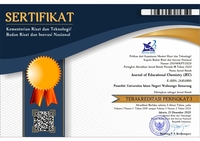Project-Based Learning-Oriented Worksheet Based on Local Wisdom and Green Chemistry
DOI:
https://doi.org/10.21580/jec.2024.6.1.20117Keywords:
green chemistry, local wisdom, project-based learning, worksheetAbstract
This study aims to determine the feasibility of worksheets and the science process skills of students using worksheets based on local wisdom-oriented projects in Central Java, with insights from green chemistry. The research follows the Research and Development (R&D) methodology, specifically the modified 4D development procedure, which includes define, design, and develop stages. The study was conducted at UIN Walisongo Semarang with 60 chemistry education students participating. Expert validation results indicated that the worksheet, based on local wisdom-oriented projects with green chemistry insight, was feasible, achieving a validity percentage of 86.53%, categorized as very valid. Observations of students’ science process skills using project worksheets 1, 2, and 3 yielded an average score of 78.6%. Pretest and post-test data on students' science process skills showed scores of 29.8 and 70.5 for the experimental class, and 29.64 and 54.46 for the control class, respectively. The average n-gain score for the experimental class was calculated to be 58%, indicating it falls within the moderately effective category. In conclusion, the worksheet, which leverages the local wisdom of Central Java and incorporates green chemistry principles into the study of acid-base material, is feasible and can be effectively used as a learning resource for students.
Downloads
References
Alacapinar, F., (2008). Effectiveness of Project-Based Learning. Eurasian J. Educational Res., 32, 17-34.
Anastas, P. T. & Warner, J. C. (1998). Green Chemistry: Theory and Practice. New York: Oxford University Press.
Azizahwati, Maaruf, Z., Yassin, R.M., & Yuliani, E., (2015), Pengembangan Modul Pembelajaran Fisika SMA Berbasis Kearifan Lokal untuk Meningkatkan Hasil Belajar Siswa. Prosiding Pertemuan Ilmiah XXIX HFI Jateng dan DIY, Yogyakarta, 25 April 2015.
Barlenti, I., Hasan, M., & Mahidin. (2017). Pengembangan LKS Berbasis Project Based Learning untuk Meningkatkan Pemahaman Konsep. Jurnal Pendidikan Sains Indonesia, 5(1), 81-86.
Bransford, J. , B. A. , & C. R. (2000). How People Learn: Brain, Mind, Experience, and School. Washington: National Academy Press.
Damiri, D. J., Tinggi, S., Garut, T., & Mayor, J. (2012). Implementation Project Based Learning on Local Area Network Training. International Journal of Basic and Applied Science, 1(1), 83-88.
Dori, Y. J. J., & Barak, M.. (2005). Enhancing Undergraduate Students’ Chemistry Understanding Throught Project-Based Learning in an IT Environment. New Jersey: Wiley Periodicals, Inc.
Fannie, R. D., & Rohati. (2014). Pengembangan Lembar Kerja Siswa (LKS) Berbasis POE (Predict, Observe, Explain) pada Materi Program Linear Kelas XII SMA. Jurnal Sainmatika, 8(1), 96-109
Khoirussaadah., & Hakim, F. (2019). Keterampilan Berpikir Tingkat Tinggi Peserta Didik Kelas XI dengan Model (Experiential Learning) pada Materi Titrasi Asam Basa. Journal of Educational Chemistry (JEC), 1(2), 62-68.
Kalayci, N., (2008). An Application Related to Project-Based Learning in Higher Education Analysis in Terms of Students Directing the Project. Education and Sci.,147(33), 85-105
Lestari, P. (2016). Kertas Indikator Bunga Belimbing Wuluh (Averrhoa Bilimbi Luntuk) Uji Larutan Asam Basa. Jurnal Pendidikan Madrasah, 1(1), 69–84.
Lubis, Z.. (2008). Potensi Budaya dan Kearifan Lokal sebagai Modal Dasar Membangun Jati Diri Bangsa. Jurnal Ilmu-ilmu Sosial, 9(3), 339-346.
Oxtoby, D. W., Gillis, H. P., & Nachtrieb, N. H.. (2001). Prinsip-Prinsip Kimia Modern. Jakarta: Erlangga.
Ozmen, H., & Yildirim, N.. (2005). Effect of Work Sheets on Stundent’s Success: Acids and Bases Sample. Journal of Turkish Science Education, 2(2), 10-13
Nurbaity. (2011). Pendekatan Green Chemistry suatu Inovasi dalam Pembelajaran Kimia Berwawasan Lingkungan. Jurnal Riset Pendidikan Kimia, 1(1), 13-21.
Saptorini, Widodo, A.T., & Susatyo, E.B. (2014). Green Chemistry dalam Desain Pembelajaran Project-Based Learning Berbasis Karakter di Madrasah Aliyah Se-Kabupaten Demak. Rekayasa Journal, 12(1), 57-69.
Saputra, A., Wahyuni, S., Rif’ati, Handayani, D., Program, M., Fisika, S. P., & Program, D. (2016). Pengembangan Modul IPA berbasis Kearifan Lokal Daerah Pesisir Puger pada Pokok Bahasan Sistem Transportasi di SMP. Jurnal Pembelajaran Fisika, 5(2), 182–189.
Silaban, R. , Sitompul, S. M. F. , Pasaribu, M. E., dan, & Simanullang, T. W. (2015). Penyediaan Lembar Kerja Peserta didik Inovatif Larutan Elektrolit dan Non Elektrolit untuk Peserta didik SMA. Jurnal Pendidikan Kimia, 7(3), 13–17.
Sugiyono. (2010). Metode Penelitian Pendidikan Pendekatan Kuantitatif, Kualitatif, dan R&D. Bandung: Alfabeta.
Situmorang, R. P.. (2016). Analisis Potensi Lokal untuk Mengembangkan Bahan Ajar Biologi di SMA Negeri 2 Wonosari. Jurnal Pendidikan Sains, 4(1), 52-57.
Suryandari, K.,C., Sajidan, Rahardjo, S.B. Prasetyo, Z.K., & Fatimah, S. (2018). Pengaruh Pembelajaran Sains Berbasis Proyek Terhadap Keterampilan Literasi Ilmu Dan Pemikiran Kreatif Calon Guru. Prosiding Cakrawala Pendidikan, Oktober 2018, Th. XXXVII, No. 3
Thiagarajan, S., Semmel, D. S., & Semmel, M. I. (1974). Instructional Development for Training Teachers of Exceptional Children A Sourcebook. Bloomington: Indiana University.
Thomas, J. W. (2000). A Review Of Research On Project-Based Learning. Retrieved March 27, 2024 from http://www.bie.org/research/study/review_of_project_based_learning_2000
Trianto. (2010). Mendesain Model Pembelajaran Inovatif Progresif. Jakarta: Kencana Prenada media group.
Trianto, (2010). Model Pembelajaran terpadu: Konsep Strategi dan Implementasinya dalam Kurikulum Tingkat Satuan Pendidikan (KTSP). Jakarta: Bumi Aksara.
Tumanggor, Rusmin. (2007). Pemberdayaan Kearifan Lokal Memacu Kesetaraan Komunitas Adat Terpencil. Jurnal Penelitian dan Pengembangan Kesejahteraan Sosial, 12(1), 1-17.
Yunus, Rasid. (2014). Nilai-nilai Kearifan Lokal (Local Genius) sebagai Penguat Karakter Bangsa Studi Emprirs Tentan Huyula. Yogyakarta: Deepublis
Wahyudi, A., Marjono, & Harlita. (2015). Pengaruh Problem Based Learning Terhadap Keterampilan Proses Sains dan Hasil Belajar Biologi Siswa Kelas X SMA Negeri Jumapolo Tahun Pelajaran 2013/2014. Bio-Pedagogi, 4(1), 5–11.
Downloads
Published
How to Cite
Issue
Section
License
The copyright of the received article shall be assigned to the journal as the publisher of the journal. The intended copyright includes the right to publish the article in various forms (including reprints). The journal maintains the publishing rights to the published articles.
Authors are permitted to disseminate published articles by sharing the link/DOI of the article at the journal. Authors are allowed to use their articles for any legal purposes deemed necessary without written permission from the journal with an acknowledgment of initial publication to this journal.

This work is licensed under a Creative Commons Attribution-NonCommercial-ShareAlike 4.0 International License.


